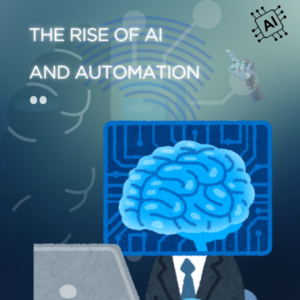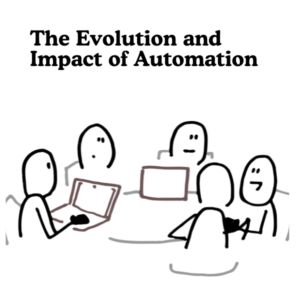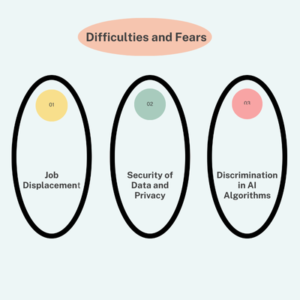The Evolution of Digital Marketing: Trends and Innovations Shaping the Future – Part 1: The Rise of AI and Automation
Rapid technology breakthroughs and changing customer behavior are driving a fundamental transformation in digital marketing. Understanding these shifts is essential to keeping ahead in a competitive landscape as we move farther into the digital age. We will examine the revolutionary role of automation and artificial intelligence (AI) in this first section of our investigation into the development of digital marketing.
The Rise of AI and Automation
Artificial intelligence is revolutionizing marketing tactics by bringing previously unheard-of levels of efficiency and customization. With chatbots for in-the-moment customer interaction, predictive analytics that predict trends and consumer behavior, and sophisticated personalization techniques, brands can now provide customized experiences thanks to AI-powered solutions. This change is optimizing marketing procedures in addition to improving consumer interactions.

- Social Media Evolution
Social media platforms are always changing, and this has an impact on how brands interact with their fans. While Instagram and LinkedIn are adjusting to new user expectations and engagement metrics, TikTok’s explosive growth is changing content tactics. Comprehending these changes is crucial to creating social media strategies that work.
- Content Marketing Trends
Long-form articles, interactive experiences, and video content are becoming more and more important for drawing in viewers and generating conversions. Marketers need to adjust to these developments as customers demand more immersive and engaging content to stay relevant.
- Data Privacy and Compliance
GDPR and CCPA requirements, for example, make data protection a high priority. These regulations are having an impact on how businesses gather, preserve, and utilize customer data, so marketers must manage compliance while continuing to employ successful tactics.
- The Role of Influencers
User-generated content and micro-influencers are becoming more and more important in the emerging field of influencer marketing. These modifications offer new opportunities for genuine brand collaborations, reflecting changes in consumer trust and participation.
- Emerging Technologies
Blockchain, virtual reality, and augmented reality are becoming indispensable tools for digital marketers. These innovations in technology are improving user experiences and offering fresh approaches to audience engagement.
Automation and Artificial Intelligence’s Transformative Power: Revolutionizing Industries and Shaping the Future
Few technical developments have had as much of an impact on today’s quickly changing world as automation and artificial intelligence (AI). In addition to evolving conventional business paradigms, these technologies are fostering previously unheard-of levels of productivity, efficiency, and innovation in a variety of sectors. Automation driven by AI is revolutionizing a variety of industries, including manufacturing, healthcare, finance, and transportation. This shift presents both enormous opportunities and formidable difficulties.
The Evolution and Impact of Automation

For many years, automation has been essential to the advancement of industry. Its initial application was in manufacturing, specifically on assembly lines for cars, where it was intended to carry out routine, rule-based operations with little assistance from humans. Automation developed over time as technology progressed, moving from basic mechanical procedures to increasingly complex systems that could do challenging jobs in a variety of industries.
Artificial intelligence (AI) greatly improves automation today by adding a layer of intelligence to the process. AI gives robots the ability to learn from data, adjust to changing circumstances, and carry out activities that have historically needed human cognitive abilities. In addition to improving operational efficiency, this combination of automation and AI is stimulating innovation in previously unthinkable ways.
AI: The Modern Automation’s Catalyst
Artificial Intelligence is an essential component of this technological revolution. Artificial intelligence (AI) is the broad term for a set of technologies that allow robots to mimic human intelligence, including learning, reasoning, and problem-solving. Machine Learning (ML), which uses algorithms to examine massive datasets to find patterns and provide predictions or judgments based on the information, is one of the most significant subsets of artificial intelligence.
Algorithms for machine learning are essential for improving automated procedures. By learning from new data, they allow systems to continuously improve their performance, which optimizes procedures and increases operations’ flexibility and responsiveness to changing circumstances.
Automation and AI in All Industries
- Manufacturing
Automation driven by AI has revolutionized the manufacturing industry. Automated systems and robots powered by AI are now able to complete complicated jobs with extreme accuracy and productivity. These technologies manage complex assembly procedures, carry out quality assurance, and even forecast maintenance requirements—all of which lead to increased output and less downtime.
AI-enabled robotic devices can now perform activities that were previously too difficult or risky for human workers. By managing risky jobs, this innovation guarantees a safer working environment in addition to improving production speed and accuracy.
- Healthcare
Automation and artificial intelligence are causing a significant revolution in the healthcare industry. AI algorithms are transforming diagnosis and therapy by analyzing medical images—such as X-rays and MRIs—to discover anomalies with high accuracy. By helping radiologists and other medical practitioners make better decisions, these algorithms enhance patient outcomes.
Chatbots and virtual assistants with AI capabilities are also improving patient engagement and offering tailored healthcare suggestions. These technologies relieve the workload of healthcare personnel and expedite patient treatment by responding to basic inquiries and providing early triage.
Furthermore, the precision of intricate surgeries is being improved by robotic surgical devices that use AI. Surgeons benefit from these devices’ improved capabilities, which lower the risk of complications and increase patient safety overall.
- Finance
Automation driven by AI is revolutionizing the financial services industry. Algorithmic trading, risk assessment, and fraud detection are just a few of the uses of AI technologies. Large volumes of financial data are analyzed by these systems to identify trends, identify abnormalities, and offer individualized financial advice.
By providing individualized services and insights based on each client’s unique financial behavior, automated financial systems are not only increasing the precision and effectiveness of financial operations but also boosting consumer experiences
- Transportation
Another industry that’s seeing significant change as a result of automation and AI is transportation. Autonomous vehicles, such as trucks, automobiles that drive themselves, and drones, have the potential to completely transform the way that people and goods are moved. These AI-driven technologies promise to improve the safety, efficiency, and environmental friendliness of transportation.
By decreasing human error, lowering road congestion, and optimizing delivery routes, autonomous technology is improving logistics. Global supply chain management and urban mobility could be drastically altered by this development.
Advantages of Automation and AI

There are several benefits to incorporating automation and AI into corporate operations:
- Enhanced Efficiency: AI technologies facilitate quicker and better-informed decision-making by processing and analyzing enormous volumes of data in real time. Automation speeds up task completion, lowers the need for manual intervention, and increases overall productivity.
- Scalability: Automation makes it possible for companies to grow without having to add as many employees. Scalability is essential for managing high workloads without sacrificing accuracy and speed.
- Improved client Service: AI-driven chatbots and virtual assistants respond quickly to a variety of client inquiries and offer comprehensive help. This minimizes the need for large customer care staff, which reduces operating expenses while simultaneously increasing customer satisfaction by cutting wait times.
- Enhanced Safety and Cooperation: AI-powered automation can carry out risky jobs in hazardous environments, lowering the risk to human workers. Furthermore, AI improves teamwork by evaluating information and assisting in decision-making, freeing up staff members to concentrate on innovative and strategic work.
Difficulties and Fears
The rise of automation and artificial intelligence (AI) has many advantages, but it also has drawbacks

- Job Displacement: The possibility of job displacement is one of the main worries. Certain jobs run the risk of becoming obsolete as automation replaces monotonous labor. To assist employees in adjusting to new responsibilities, firms and governments must fund reskilling and upskilling initiatives.
- Security of Data and Privacy: It is crucial to protect sensitive client data in light of the growing usage of AI. Companies need to put strong security measures in place and follow moral standards to protect customer privacy and stop abuse.
- Discrimination in AI Algorithms: Since AI systems learn from data, biased training sets of data could cause the algorithms to reinforce preexisting biases. This problem may have a big impact on loan and hiring decisions, for example. To address and reduce bias, transparent and accountable AI systems must be developed.
Automation and Artificial Intelligence in the Future
The future of automation and artificial intelligence is both promising and difficult. As technology continues to improve, AI systems will become even more adept, performing tasks that were formerly deemed distinctively human. Automation will improve productivity in all industries by significantly streamlining procedures.
AI-powered financial advisors, self-driving cars, and customized learning environments are just a few of the advances that the future holds. These developments will bring new chances for growth and development as they continue to revolutionize various industries and aspects of daily life.
Businesses must cultivate an innovative culture and make essential investments in infrastructure and talent development if they want to fully realize the potential of automation and artificial intelligence. Aligning human and machine cooperation effectively will be essential to realizing the full potential of these technologies and accelerating.
Conclusion
Artificial intelligence and automation are not merely new technology trends; they are revolutionary forces that are transforming multiple industries and the nature of employment in the future. The manufacturing, healthcare, financial, and transportation sectors are all being affected by the previously unheard-of levels of efficiency, productivity, and imagination brought about by the integration of various technologies.
Automation and artificial intelligence (AI) offer tremendous potential as well as important concerns as they develop. The potential benefits of higher safety, better customer service, and more operational efficiency are countered by fears about algorithmic bias, data privacy, and job displacement. Harnessing the full potential of these technologies will depend on addressing these issues through careful planning, workforce development investments, and ethical concerns.
The road forward is to carefully embrace automation and AI, making sure that the positive effects are fully utilized while minimizing any negative effects. Businesses and society can handle the revolutionary impact of AI-powered automation and unlock a limitless future by investing in the necessary infrastructure and skills, as well as cultivating a culture of creativity.
Automation and artificial intelligence (AI) are not only tools but additionally, crucial factors influencing the course of our civilization in this period of fast technological growth. To advance and achieve sustainable growth going forward, human brilliance and computer intelligence collaboration will be essential.
